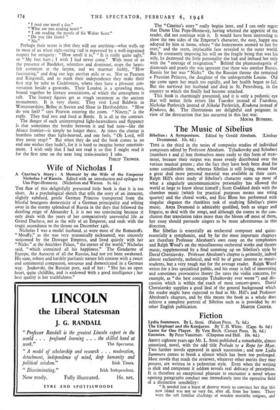• - Wife of Nicholas I
A Czarina's Story : A Memoir by the Wife of the Emperor Nicholas I of Russia. Edited with an introduction and epilogue by Una Pope-Hennessy. (Nicholson and Watson. 8s. 6d.)
THE flaw of this delightfully presented little book is that it is too short. As a psychological sketch that tells the story of an innocent, slightly subdued, gentle German Princess transported from the blissful bourgeois domesticity of a German principality and wilting away in the stormy splendour of Russia in the days that followed the dazzling reign of Alexander I, it is not too convincing because it only deals with the years of her comparatively uneventful life as Grand Duchess, not as the wife of an Emperor, and ends with the tragic ascendance to the throne on December i4th.
Nicholas I was a model husband, as were most of the Romanoffs. " Mouffy," as she was very teutonicallY nicknamed; was sincerely welcomed by the Dowager Empress, and lived quietly with her " Nicks " at the Anichkev Palace, " the corner of the world," Nicholas said, " which contained all his happiness." The Gendarme of Europe, the Autocrat of all the Russias, had not yet been awakened. His sane, robust and harshly puritanic nature felt content with a sweet and sentimental companion, sensuous and domesticated in a German way. Joukovski, the Russian poet, said of her : " She has an open heart, quite childlike, and is endowed '*ith a good intelligence ; her best quality is her truthfulness."
The "Czarina's story" really begins later, and I can only regret that Dame Una Pope-Hennessy, having whetted the appetite of the reader, did not continue with it. It would have been interesting to show the two sides of the Emperor's character, the easy, happy one adopted by him at home, whete " the honeymoon seemed to last for ever," and the stern, implacable face revealed to the outer world. But by constantly imposing his will on the fragile being that was his wife, he destroyed the little personality she had and imbued her only with the " courage of resignation." Behind the phantasmagoria of diamonds and pearls she was ignorant that there was another Russia. Russia for her was " Nicks." On the Russian throne she remained a Prussian Princess, the daughter of the unforgettable Louise. Old age came upon her much, too rapidly, and her health began to fail. But she survived her husband and died in St. Petersburg, in the country to which she finally had become attached.
This book is charmingly presented, and it is only a pedantic eye that will notice little errors like Tsarskoi instead of Tsarskoie, Nicholas Pavlovich instead of Nikolai Pavlovich, Krukova instead of Krukovo, &c. The illustrations are delightful and poignant in view of ;he destruction that has occurred in this last war.
MOURA BUDBERG.






























 Previous page
Previous page